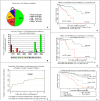Viral endomyocardial infection is an independent predictor and potentially treatable risk factor for graft loss and coronary vasculopathy in pediatric cardiac transplant recipients
- PMID: 20688214
- PMCID: PMC2963018
- DOI: 10.1016/j.jacc.2010.02.060
Viral endomyocardial infection is an independent predictor and potentially treatable risk factor for graft loss and coronary vasculopathy in pediatric cardiac transplant recipients
Abstract
Objectives: This study sought to evaluate the outcome and prevalence of viral endomyocardial infection after cardiac transplantation.
Background: Viral myocardial infection causes heart failure, but its role after cardiac transplantation is unclear. We hypothesized that viral infection of the cardiac allograft reduces graft survival.
Methods: Between June 1999 and November 2004, 94 pediatric cardiac transplant patients were screened for the presence of viral genome in serial endomyocardial biopsies (EMBs) using polymerase chain reaction (PCR) assays. Graft loss, advanced transplant coronary artery disease (TCAD), and acute rejection (AR) were compared in the PCR-positive (n = 37) and PCR-negative (n = 57) groups, using time-dependent Kaplan-Meier and Cox regression analyses. From November 2002 to November 2004, intravenous immunoglobulin therapy (IVIG) was administered to patients with PCR-positive EMBs. The outcomes of the IVIG-treated, PCR-positive patients (n = 20) were compared with IVIG-untreated, PCR-positive patients (n = 17).
Results: Viral genomes were detected in EMBs from 37 (39%) patients; parvovirus B19, adenovirus, and Epstein-Barr virus (EBV) were the most common. The PCR-positive group (n = 37, 25% graft loss at 2.4 years) had decreased graft survival (p < 0.001) compared with the PCR-negative group (n = 57, 25% graft loss at 8.7 years) and developed advanced TCAD prematurely (p = 0.001). The number of AR episodes was similar in both groups. On multivariate analysis, presence of viral genome was an independent risk factor for graft loss (relative risk: 4.2, p = 0.015). The time to advanced TCAD after becoming PCR-positive was longer in the IVIG-treated patients (p = 0.03) with a trend toward improved graft survival (p = 0.06).
Conclusions: Viral endomyocardial infection is an independent predictor of graft loss in pediatric cardiac transplant recipients. This effect appears to be mediated through premature development of advanced TCAD. IVIG therapy in this subgroup may improve survival and merits further investigation.
Copyright (c) 2010 American College of Cardiology Foundation. Published by Elsevier Inc. All rights reserved.
Figures



References
-
- Barker WH, Mullooly JP, Getchell W. Changing incidence and survival for heart failure in a well-defined older population, 1970–1974 and 1990–1994. Circulation. 2006;113:799–805. - PubMed
-
- Taylor DO, Edwards LB, Boucek MM, et al. Registry of the International Society for Heart and Lung Transplantation: twenty-second official adult heart transplant report--2005. J Heart Lung Transplant. 2005;24:945–55. - PubMed
-
- Boucek MM, Edwards LB, Keck BM, Trulock EP, Taylor DO, Hertz MI. Registry of the International Society for Heart and Lung Transplantation: eighth official pediatric report--2005. J Heart Lung Transplant. 2005;24:968–82. - PubMed
-
- Bowles NE, Richardson PJ, Olsen EG, Archard LC. Detection of Coxsackie-B-virus-specific RNA sequences in myocardial biopsy samples from patients with myocarditis and dilated cardiomyopathy. Lancet. 1986;1:1120–3. - PubMed
-
- Kuhl U, Pauschinger M, Seeberg B, et al. Viral persistence in the myocardium is associated with progressive cardiac dysfunction. Circulation. 2005;112:1965–70. - PubMed
Publication types
MeSH terms
Grants and funding
LinkOut - more resources
Full Text Sources
